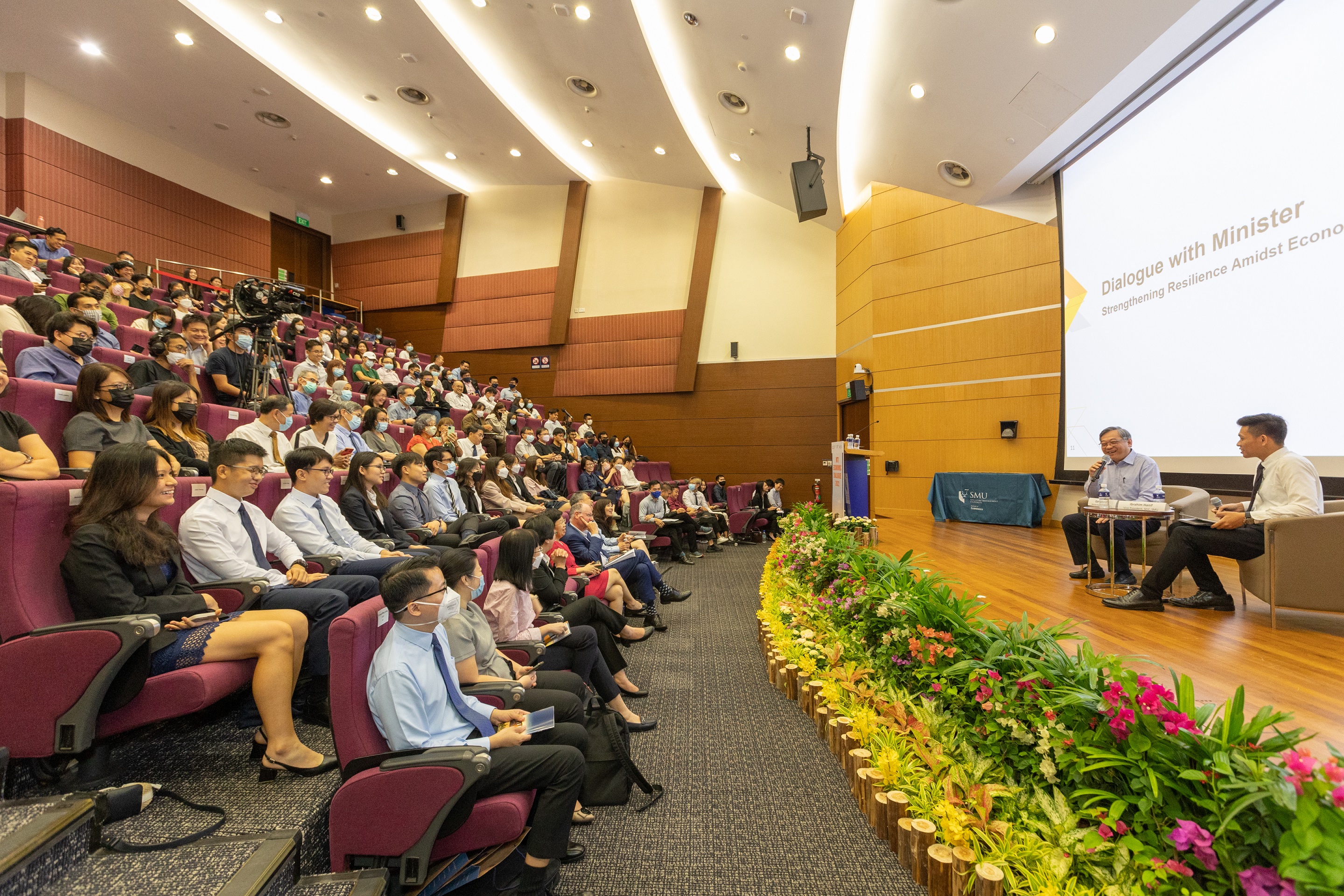![(from left) Prof Hoon Hian Teck, Dean of SMU School of Economics, SMU Provost Prof Timothy Clark, Minister for Trade and Industry, Mr Gan Kim Yong and SMU President Prof Lily Kong at the MTI Economic Dialogue held at SMU on 2 September 2022. [Photo: William Goh]](/sites/news.smu.edu.sg/files/styles/max_325x325/public/smu/news/1_52.jpg?itok=8xChahzO)
The MTI Economic Dialogue, which was started in 2008, serves as a platform for students to gain insights into pertinent economic issues and challenges facing Singapore, and the role of Economics in policymaking.
This year, the event was graced by Minister for Trade and Industry, Mr Gan Kim Yong, with the theme of his keynote address being “Strengthening Resilience Amidst Economic Headwinds”. Following the address, students had the opportunity to engage Minister Gan in an interactive dialogue session.
“Singapore has strong economic fundamentals and a diversified economy on which to build. I would like to underscore two qualities that will stand Singapore in good stead,” said SMU President, Prof Lily Kong, in her opening remarks. “The first might be called economic dynamism. This refers to society’s ability to marshal different stakeholders – such as the resident workforce and businesses – to bridge diverse interests, in order to leverage economic opportunities to grow the economy, while maintaining social cohesion and a stable political equilibrium.”
“The second is economic inclusion, which includes boosting the wages of lower wage workers and facilitating upward social mobility,” she added. “Taking advantage of economic opportunities to grow the economy enables us to generate the fiscal resources to support economic inclusion.”
Commenting on SMU’s role as Singapore’s “management” university, Prof Kong articulated the University’s particular role and responsibility to nurture students and equip them with an understanding of the major economic challenges and growth opportunities for Singapore and the region, preparing them to be the next generation leaders, innovators and entrepreneurs to build a resilient economy.
“This is why we have identified three strategic priorities as part of our Vision 2025 ambitions, areas we believe are pivotal to Singapore’s and indeed, the world’s new economic conditions. These are: Digital Transformation, Sustainable Living and Growth in Asia,” said Prof Kong. “They serve as cross-disciplinary focal points cutting across SMU’s education programmes, research and global engagement, whilst setting us in line with the future needs of Singapore as well as Asia.”
“If Singapore is to strengthen resilience in the face of economic headwinds, and to take advantage of opportunities therein and thereafter, we believe it will need a cadre of workers, entrepreneurs, and professionals who are adept in an age of digitalisation, who appreciate the criticality of sustainability, and who can navigate and contribute to Asia’s growth,” commented Prof Kong. “Likewise, our faculty, through their research, can make meaningful impact through contributing insights, ideas and innovations in the making of a digitally connected, sustainable world.”
The full story published in The Straits Times (2 September 2022) is enclosed below:
S'pore needs to build new growth engines to remain competitive and continue investing in its people: Gan Kim Yong
SINGAPORE - New engines of growth are needed to strengthen Singapore's economic resilience, even as it continues to invest in its people so the workforce remains relevant.
Trade and Industry Minister Gan Kim Yong said there is a need to identify new opportunities for Singapore to remain competitive amid headwinds in the global economy.
As it does so, the Government will also continue to invest in the training and upgrading of its people, to ensure that the Singapore workforce remains relevant and competitive amidst rapid technological changes and disruptions.
"As businesses innovate, restructure and renew their business models, Singaporeans must also play our part," said Mr Gan on Friday.
"We must continue to deepen our skills and widen our skill sets, remain nimble, and stand ready to seize the opportunities that are being created."
The minister, who was speaking at the 14th annual Ministry of Trade and Industry (MTI) Economic Dialogue held at Singapore Management University, said workers will also have to take ownership for their own training and upgrading.
This includes embracing lifelong learning and training, a move that can be achieved with the support of businesses.
"It is a necessary journey to keep the workers relevant to the new economy that is emerging," he said.
At the event, Mr Gan discussed with students from local universities the key economic issues Singapore is facing.
He outlined the ongoing challenges of inflation, the slowing global economy and pressures on global trade, the importance of upholding a rules-based international trade system, as well as how the Republic is dealing with them.
He said efforts to transform the economy are underway, pointing to the strategies outlined in the Singapore Economy 2030 plan.
Mr Gan had unveiled the vision in March this year, which is driven by strategies across four key pillars of the Singapore economy - manufacturing, trade, enterprises and services.
On Friday, Mr Gan presented the Economist Service Scholarship to five recipients and the MTI Economist Service Undergraduate Awards to some of the top economics students in local universities.
He said it is crucial for Singapore to have capable economists in the public sector who can provide high-quality economic analysis to inform the formulation of public policies.
Public sector economists were critical in the development of support measures provided to businesses and workers at the height of the Covid-19 pandemic, Mr Gan said.
Ms Jemma Cheah, 19, received the Economist Service Scholarship.
She is reading philosophy, politics and economics at the National University of Singapore.
Speaking to the media after the event, she said the issues of the day may be different when she enters the workforce after her studies.
"What I wish to bring to the table is adaptability, the ability to seize opportunities as they arise even out of uncertainties," Ms Cheah said.
